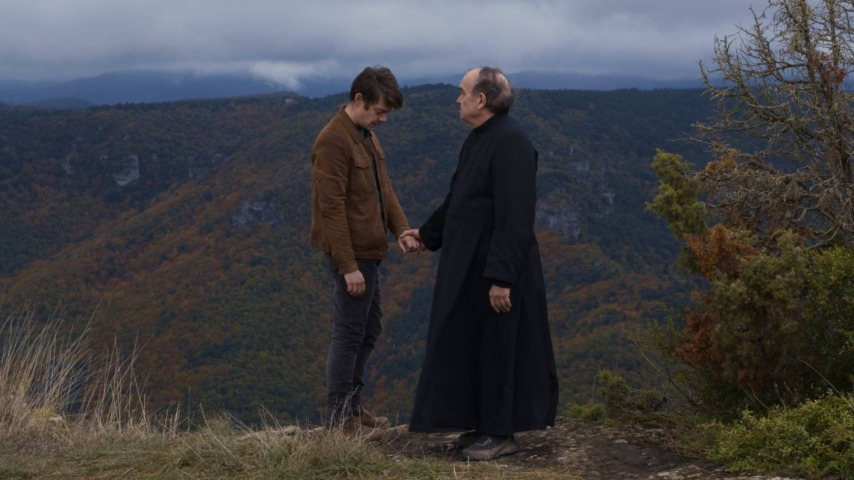For 30-odd years, the queer, working-class films of the French writer-director Alain Guiraudie have explored the strange vagaries of desire with a deadpan sensibility. In Stranger By The Lake (his best-known work, albeit an atypical one), a man cruising for sex at a nude beach is drawn to a handsome stranger after witnessing him commit a murder, resulting in an enigmatic, absurdist deconstruction of the classic thriller formula of sex and death. Guiraudie’s latest, Misericordia, feels in some ways like a deliberate inversion of that (sexually explicit) earlier film: first, because it features no sex whatsoever (though not for lack of trying on the part of the characters), and, second, because its deadly object of desire is the confused protagonist.
There’s plenty more that will feel familiar to those who have followed Guiraudie’s work: the opening driver’s eye view of a road; the predilection for landscapes and dream logic; a structure that mostly consists of the main character cycling through a small handful of locations. The story begins with thirty-something Jérémie (Félix Kysyl) returning home to a small village for the funeral of Jean-Pierre, the local baker who mentored him in the trade. Jean-Pierre’s widow, Martine (Catherine Frot), invites him to stay for the night and puts him up in the childhood bedroom of her son, Vincent (Jean-Baptiste Durand). For reasons that he can’t fully articulate, Jérémie ends up staying for the next day, and then the next and the next. Martine thinks he might be interested in taking over her husband’s business; Vincent, in turn, accuses him of sinister motives and trying to seduce his grieving mother.
The truth, however, is that Jérémie is more interested in looking for mushrooms in the nearby forest, where he often runs into the parish priest (Jacques Develay), and paying daily visits to a slovenly neighbor, Walter (David Ayala), who he insists was once his close friend (though, in fact, it was Vincent who was friends with Walter back in the day). There is, eventually, a gruesome, unpremeditated murder. A body is buried in the woods, and Jérémie finds himself improvising an alibi that gets more convoluted once a couple of pesky cops (a Guiraudie staple) arrive to investigate.
If Stranger was a sort of deconstructed slasher film, then Misericordia could be read as Guiraudie’s take on Hitchcock, bringing to mind bits of the master’s paranoid black-and-white suspense films as well as the Technicolor black comedy The Trouble With Harry; its turns and character dynamics are all but begging to be diagrammed in terms of doublings, role reversals, and offbeat rhymes. But though Misericordia’s resemblance to a genre exercise is hardly unintentional, it turns out to be incidental: The tensions and suspicions Guiraudie is drawing out have less to do with suspense and guilt and more to do with the aforementioned subject of desire. As is always the case with his work, sexualities are fluid and categorically transgressive, longings hide currents of violence, and vice versa. (Unsurprisingly, Guiraudie has repeatedly cited the writer and philosopher Georges Bataille as his biggest influence.)
While it lacks the surrealistic and fairy-tale elements that distinguish many of Guiraudie’s films (among them Sunshine For The Poor, Time Has Come, and Staying Vertical), Misericordia is nonetheless pervaded by a casual dreaminess and a disregard for the strictures of realism that leads in some (intentionally) silly directions. The exclusion of sex could be interpreted as a wink toward the real world (in that our own curious desires rarely lead anywhere), or as a deliberate structuring absence that places the unformed, unconsummated longings of Jérémie and the other characters into an abstract context, where puzzles of eroticism can be examined without all the fun messy parts. Another possible interpretation, which seems supported by the larger body of work, is that it’s actually our desires that exist in an unreal world. In order to depict them accurately, one must leave reality behind—and bring a sense of humor.
Director: Alain Guiraudie
Writer: Alain Guiraudie
Starring: Félix Kysyl, Catherine Frot
Release Date: March 21, 2025









































